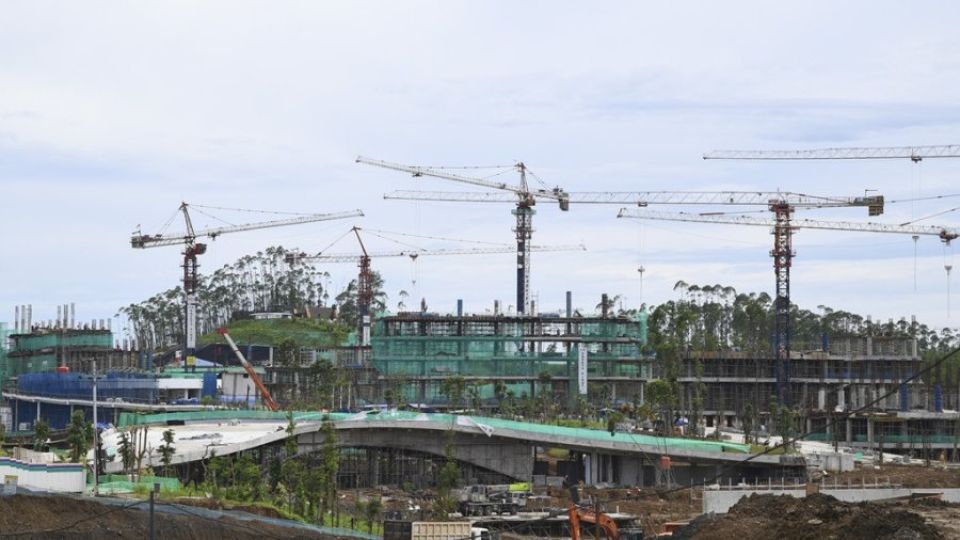December 11, 2023
JAKARTA – Doubt has been cast over the future of President Joko “Jokowi” Widodo’s upcoming legacy of the new capital city Nusantara, as a statement from a presidential candidate on the lack of interest in continuing its development might deter investors from throwing money at the project.
Foreign investors, the already elusive key to the project’s realization, are likely to be deterred from throwing their hats in the ring in the foreseeable future, as next year’s election may create unpredictability for Nusantara’s future.
The House of Representatives has future-proofed the new capital development by passing in October a revision to the Nusantara Capital City (IKN) Law that prevents future presidents from ditching the project.
But former Jakarta governor Anies Baswedan, who is running for the presidency with National Awakening Party (PKB) chair Muhaimin Iskandar, repeatedly stated that the pair would not prioritize Nusantara’s development if they get elected.
The latest occasion of his stating his opposition to the new capital city was during a panel held by the Foreign Policy Community of Indonesia (FPCI) in Jakarta on Dec. 2, during which he said the money earmarked for Nusantara could be used to solve other “urgent” issues, such as improving the education or health system.
“[The benefits of] building health facilities will be felt by all Indonesian people,” Anies said, “while the IKN construction can only benefit the state apparatus working for the state. What should happen is the state works for the people.”
Muhaimin previously said in late October that the latest revision of the IKN Law might give the future Indonesian president no choice other than to continue the project. But Anies asserted that the new capital project could be delayed, “if it’s important [but] not urgent.”
Read also: Elections won’t affect IKN, Jokowi tells potential investors
In recent years, President Jokowi’s administration has pulled out all stops to realize Nusantara, which is forecast to cost around Rp 466 trillion (US$30 billion). The state budget will only cover 20 percent of the cost, while the rest will be funded by foreign investments and private-public partnerships.
While Jakarta claims it has received around 300 letters of intent (LOIs) for Nusantara, no significant investments have been made so far, Jokowi admitted recently. Analysts previously noted the unattractive commercial potential and the country’s lackluster economic structure among the top reasons for the struggling pitch to investors.
Anies’ statement may exacerbate the situation, with some investors starting to question the Nusantara project, according to a cabinet member.
“Some investors are starting to question and doubt the project because of a certain presidential candidate’s statement,” Investment Minister Bahlil Lahadalia said on Monday, as quoted by kompas.com.
“How can this candidate suddenly speak of wanting to cancel the project? We need to answer the investors’ doubt now!” he continued, while asserting that the new capital would be continued as mandated by the law regardless of who was elected as president.
While Anies-Muhaimin might not be the frontrunner according to various polls, Anies’ public disapproval of Nusantara may be enough to shift the minds of foreign investors.
“Even if only one candidate is opposing the plan, such opposition would affirm the doubts of any prospective foreign investors,” said political economy researcher Habib Abiyan Dzakwan of the Centre for Strategic and International Studies (CSIS).
No legal guarantee
In contrast to Anies, his rivals Defense Minister Prabowo Subianto and former Central Java governor Ganjar Pranowo have expressed interest in continuing the new city project.
Prabowo, who is running with Surakarta mayor and First Son Gibran Rakabuming Raka, stated on various occasions that he would pick up Nusantara where Jokowi left. His political party Gerindra pledged on Nov. 30 to increase the state budget allocation for the project if Prabowo was elected.
Meanwhile, Ganjar reaffirmed his commitment to building Nusantara as he visited the construction project as part of his campaign trail in East Kalimantan on Thursday. He and running mate Coordinating Political, Legal and Security Affairs Mahfud MD have promised to continue the new capital’s construction in stages on their official platform.
“From the beginning, I’ve always been consistent [about] implementing an established regulation [on Nusantara],” he said on Thursday. “Hopefully, the city will come to realize Indonesia’s hopes.”
But commitments from the other two candidates were not enough to reassure analysts that the new city would be realized the way Jokowi had planned.
The Nusantara project had been included in the national long-term development plan, thus making it difficult for the future presidents to scrap the idea, said Feri Amsari of Andalas University’s Constitution Study Center (PUSaKO).
“However, there’s a possibility that the new president will issue a government regulation in lieu of law [Perppu] to cancel the project that will be passed [into law] by the legislative bodies,” he continued.
Read also: Ganjar promises to prioritize 3T region development despite IKN construction
The 2024 legislative election will be key to how Nusantara continues, Feri suggested, as a House of Representatives ruled by an opposition party to the government might raise the idea of revising the IKN Law and jeopardize the city’s development.
Such an element of unpredictability, along with other issues like corruption, was also among the reasons that have deterred foreign investors from committing to Jokowi’s Nusantara visions, analysts concurred. Investors would be prudent and wait until stability is guaranteed after the election.
“Indonesia is uncompetitive for its lack of legal certainty, while any big investments require certainty,” CSIS’ Habib said. “Economic reform is important, and Jokowi has put some work into that. But it’s not enough without legal [stability and] enforcement.” (kuk)


